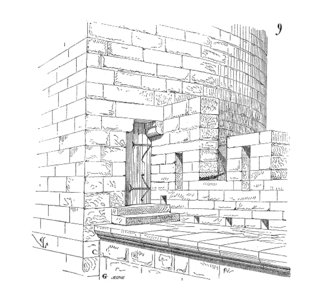Related Research Articles

The nave is the central part of a church, stretching from the main entrance or rear wall, to the transepts, or in a church without transepts, to the chancel. When a church contains side aisles, as in a basilica-type building, the strict definition of the term "nave" is restricted to the central aisle. In a broader, more colloquial sense, the nave includes all areas available for the lay worshippers, including the side-aisles and transepts. Either way, the nave is distinct from the area reserved for the choir and clergy.

Trade justice is a campaign by non-governmental organisations, plus efforts by other actors, to change the rules and practices of world trade in order to promote fairness. These organizations include consumer groups, trade unions, faith groups, aid agencies and environmental groups.
Allure may also refer to:

A ha-ha is a recessed landscape design element that creates a vertical barrier while preserving an uninterrupted view of the landscape beyond.
The random walk hypothesis is a financial theory stating that stock market prices evolve according to a random walk and thus cannot be predicted. It is consistent with the efficient-market hypothesis.

Sir Alured Clarke was a British army officer. He took charge of all British troops in Georgia in May 1780 and was then deployed to Philadelphia to supervise the evacuation of British prisoners of war at the closing stages of the American Revolutionary War. He went on to be Governor of Jamaica and then lieutenant-governor of Lower Canada in which role he had responsibility for implementing the Constitutional Act 1791. He was then sent to India where he became Commander-in-Chief of the Madras Army, then briefly Governor-General of India and finally Commander-in-Chief of India during the Fourth Anglo-Mysore War.
John Alured (1607–1651) was an army officer who fought for the parliamentary cause in the English Civil War and was one of the regicides of King Charles I in 1649.
This page is a glossary of architecture.

Enceinte is a French term denoting the "main defensive enclosure of a fortification". For a castle this is the main defensive line of wall towers and curtain walls enclosing the position. For a settlement it would be the main town wall with its associated gatehouses and towers and walls.

A walkover, also W.O. or w/o is the awarding of a victory to a contestant because there are no other contestants or the other contestants have been disqualified or have forfeited. The term can apply in sport but also to uncontested elections, when it is also referred to as winning "by default". The word is used more generally by extension, particularly in politics, for an election in which the winner is not the only participant but has little or no competition. The narrow and extended meanings of "walkover" as a single word are both found from 1829.
Edward Alured Draper was a military officer in the British Army and civil servant in Mauritius.
Alured was a medieval Bishop of Worcester.

A curtain wall is a defensive wall between two towers (bastions) of a castle, fortress, or town.

A chemin de ronde, also called an allure, alure or, more prosaically, a wall-walk, is a raised protected walkway behind a castle battlement.

Alured Clarke (1696–1742) was Dean of Exeter between 1741 and 1742.
Thomas Alured was an English landowner and politician who sat in the House of Commons from 1628 to 1629.
Charles Clarke was an English barrister, judge and politician.

Ballymalis Castle is a tower house and National Monument located in County Kerry, Ireland.
References
- ↑

| This architectural element–related article is a stub. You can help Wikipedia by expanding it. |